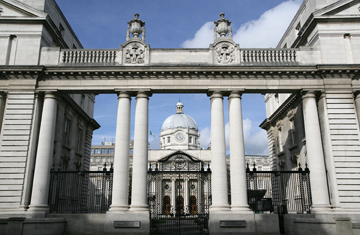
The Irish government buildings are seen in Dublin, Ireland, on Thursday, Oct. 7, 2010
The sickness at the heart of the Irish economy is even worse than had previously been imagined. On Oct. 18, senior officials in the Department of Finance briefed the opposition parties — Fine Gael, Sinn Fein and the Labour Party — and the grimness of their faces as they emerged from the talks told the story. Labour finance spokeswoman Joan Burton described the situation as "very challenging" and "pretty horrific." Although the opposition parties are bound by confidentiality not to disclose details of the meeting, the scale of the public finance crisis is "truly terrifying" according to Stephen Collins, political editor of the Irish Times. Most people already realized that the €7.5 billion ($10.3 billion) worth of spending cuts and tax increases proposed four years earlier by Finance Minister Brian Lenihan were — due to downward revision in the projections for economic growth — hopelessly out of date. A more realistic figure, the International Monetary Fund recently determined, is around €10 billion ($13.7 billion). Now it appears that even that extraordinary amount may fall far short of the reality. Ireland, insiders say, could face tax raises and savage cuts to public spending to the tune of €15 billion ($20.6 billion) over four years.
And that added burden is likely to come sooner rather than later: the first and possibly worst hit should come in the December budget. People were already bracing themselves for a €3 billion ($4.1 billion) package of cuts and taxes. Now the adjustment may be between €4.5 and €6 billion ($6.2 and $8.2 billion), depending on the amount of "front-loading" — packing the toughest measures into the initial budget of the four-year plan — the government thinks the economy can take.
Several factors account for the shortfall. Economic growth is projected at a paltry 2.2%, the cost of servicing the national debt is rising, and there is a shortfall in projected tax revenue. Placing the dire situation in a historical context, Dan O'Brien, economics editor with the Irish Times, says that "Ireland's budget deficit this year peaks at the same percentage budget deficit that the U.S. had during the Second World War." And while many other economies face similar problems, Ireland may have a bigger fight on its hands. In 2009, the Irish economy experienced the single biggest decline of any OECD country.
Given those worrying indicators, plenty of fingers are being pointed at the Irish government. "If you could wreck an economy it would be difficult to go about it in a more effective fashion than this government and the previous government have done," says David McWilliams, a well-known Irish economist and author. He believes that the Ireland of the past decade will become the example of bad economic management. "The problem for us is that the very people who didn't see the bust coming and cheer-led the country over a cliff are the same people in power now."
Despite the harsh words — and intense public frustration and despair — there's no sign yet that Greek or French-style social unrest is brewing on the streets of Dublin, and O'Brien believes it's unlikely to happen. He says that unlike Greece, which has only been a democracy for a couple of decades, Ireland has no tradition of radical politics. The risk, he says, is entirely political: the government needs sufficient parliamentary support to put their planned budgetary measures in place.
Commentators have plenty of ideas about how to pull the country out of the economic disaster zone. Liam Collins, editor of the Sunday Independent, believes that "we need a big bad boss to sort us out." He says that "the IMF should come in and do all the things that need to be done: cut the number of civil servants, their pay — which is about 25% better than wages in the private sector — their pensions, their quangos." He also wants to see the Irish government re-floating the banks, reviving the housing and construction industry at a realistic level, and getting the retail economy working again with lower wages and costs.
And while Irish citizens will no doubt balk at the thought of cuts, it's widely regarded as a necessary evil. Collins believes that above all else the Irish need to learn to live within their means again. "We need to realize that we're not the Masters of the Universe, just a little island on the edge of Europe, where we need to live fairly modestly and forget about the binge we've just been through." Even in a country with a history of feast and famine, that may prove a hard pill to swallow.
— With reporting by Claire Mc Cormack
